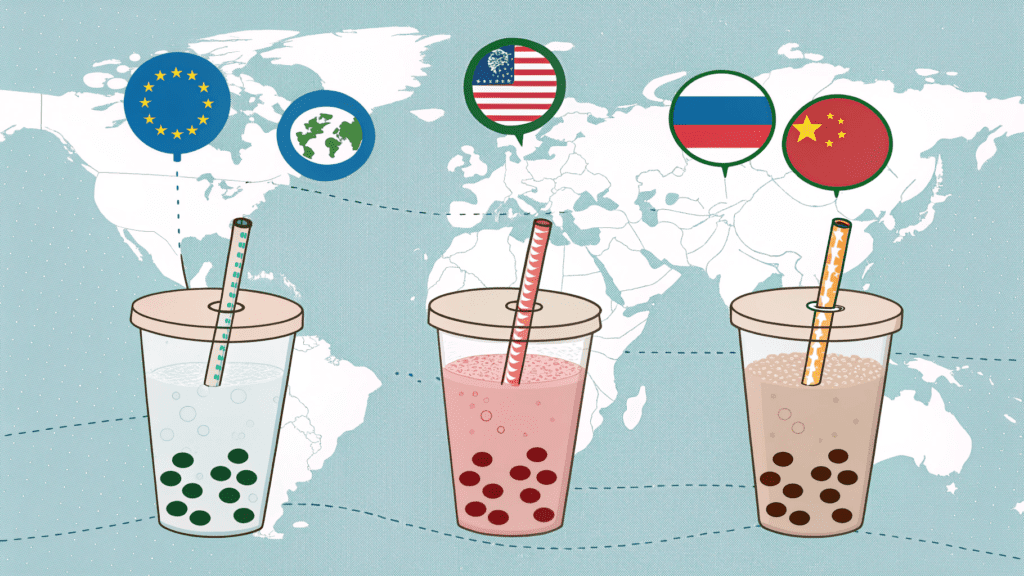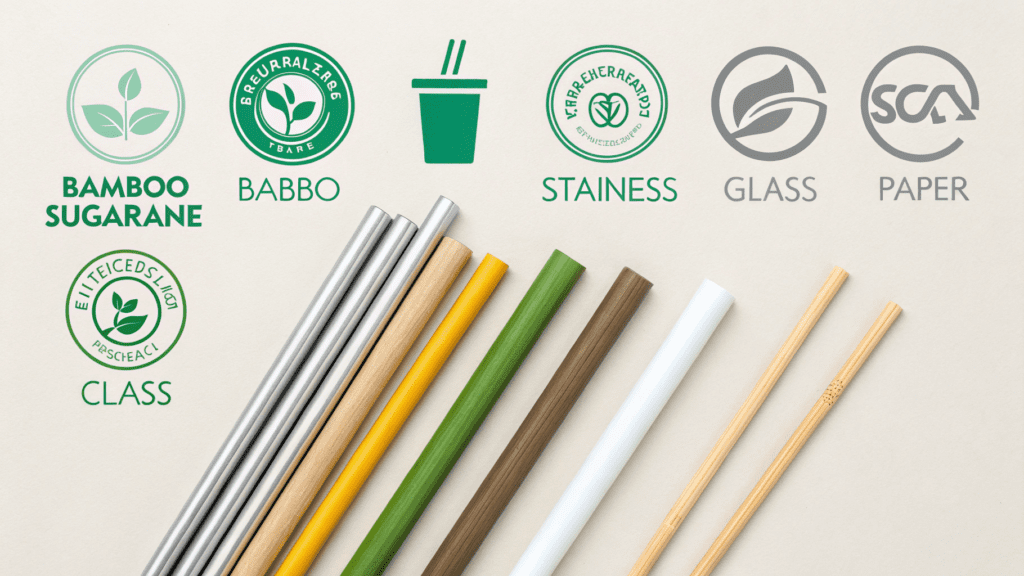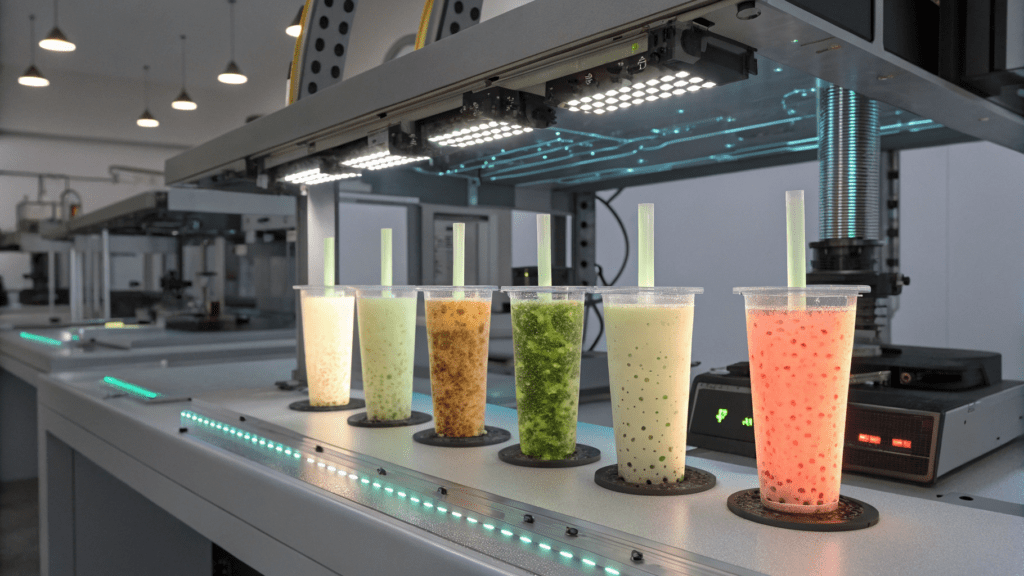
The global bubble tea market, a vibrant and rapidly expanding sector, presents both immense opportunities and complex challenges for procurement managers, operations directors, sustainability officers, and supply chain executives. Valued at approximately USD 2.75 billion in 2023, this market is projected to surge to USD 5.9 billion by 2032, exhibiting an impressive Compound Annual Growth Rate (CAGR) of 8.9% from 2025-2032. This exponential growth necessitates a highly strategic approach to wholesale boba straw procurement, not just for operational efficiency, but for critical compliance and brand alignment in an increasingly sustainability-driven landscape.
Ignoring the evolving regulatory environment and shifting consumer demands for eco-friendly products carries significant operational and commercial repercussions. Businesses failing to adapt risk market access restrictions, brand erosion, and missed opportunities for competitive differentiation. This comprehensive guide provides critical insights for decision-makers navigating the complexities of wholesale boba straw sourcing, emphasizing how strategic choices can transform a compliance burden into a distinct market advantage.Strategic boba straw procurement is vital for hospitality and foodservice to ensure compliance and enhance brand value.
The Evolving Landscape of Wholesale Boba Straw Procurement

Historical Context: From Innovation to Environmental Imperative
Boba tea, originating in Taiwan in the 1980s, revolutionized the beverage experience by introducing chewy tapioca pearls. This innovation immediately necessitated a wider straw to allow customers to fully enjoy both the liquid and the pearls, addressing earlier frustrations with standard narrow straws. A significant design breakthrough was the development of the iconic slanted edge, enabling the straw to effortlessly pierce the sealed plastic film lids commonly used on bubble tea cups. As bubble tea’s popularity exploded globally through the 1990s and 2000s, this exponential demand fueled the rapid growth of wholesale straw production, initially dominated by plastic.
Global Plastic Bans Reshaping the Boba Straw Market
The proliferation of single-use plastics has led to mounting environmental concerns and a wave of stringent regulations worldwide. The European Union, for instance, banned single-use plastic items, including straws, effective July 3, 2021, a directive specifically targeting the 10 most commonly found single-use plastic items on European beaches, which account for 70% of marine litter. (Source: European Commission). Similarly, Taiwan, the birthplace of boba tea, initiated a plastic straw ban for dine-in services in government offices, schools, department stores, shopping malls, and fast-food chains in 2019, with an ambitious aim for a complete phase-out by 2030. Repeat violators in Taiwan can face fines of up to NT$6,000 (approximately $190 USD). The United Kingdom also implemented a ban on the distribution of plastic straws in July 2021, requiring businesses to offer alternatives and provide plastic straws only upon request and out of sight.
In the United States, a patchwork of state and local regulations has emerged. Seattle was a pioneer, implementing a ban on single-use plastic straws and utensils in July 2018. California followed suit in July 2019, enacting a “straws upon request” law for full-service restaurants, a policy mirrored in Washington D.C. (2019), Los Angeles (April 2019), New York City, and Howard County, Maryland. This fragmented regulatory environment creates a complex compliance landscape for businesses operating across different regions.
Consumer Demand for Sustainable Boba Straws
Beyond regulatory pressures, a powerful market force is the accelerating consumer demand for eco-friendly products. Approximately 80% of consumers actively prefer environmentally friendly products, fundamentally reshaping market dynamics. A significant 90% are even willing to pay up to 10% more for biodegradable packaging, clearly signaling a readiness to invest in sustainable choices. This preference extends directly to boba straws, with the global eco-friendly straw market projected to reach an estimated $25.1 billion by 2035. For businesses, embracing sustainable straw options is no longer just a “nice-to-have”; it’s a strategic imperative that directly impacts brand perception, customer loyalty, and market share.Global plastic bans and consumer demand are rapidly reshaping the boba straw market towards sustainable alternatives.
Key Considerations for Wholesale Boba Straw Procurement

Strategic procurement of boba straws involves a nuanced balance of material science, design functionality, regulatory compliance, cost-effectiveness, and supply chain resilience. Prioritizing suppliers who adhere to robust food safety and quality standards, such as ISO 22000, HACCP, and FDA registration, is paramount. Additionally, evaluating Minimum Order Quantities (MOQs) and establishing clear Delivery Service Level Agreements (SLAs) are critical for maintaining seamless operations.
Material Options and Sustainability Certifications for Boba Straws
The market offers a diverse array of boba straw materials, each with unique properties and sustainability profiles:
- Biodegradable Boba Straws: This category encompasses various plant-based alternatives designed to break down naturally.
- Paper straws: Often enhanced with anti-sog coatings, these are widely available. However, a 2023 study raised concerns about the presence of “forever chemicals” (PFAS) in some paper straws. Happy Kick offers 12mm paper straws, individually wrapped, and certified PFAS-free.
- الخيزران: A rapidly renewable resource, bamboo straws are both biodegradable and often reusable.
- قصب السكر (تفل قصب السكر): Made from leftover sugarcane pulp, these straws are 100% biodegradable, durable, and generally soggy-free, promoting a circular economy. They are often certified by bodies like BPI and ASTM D6400 for compostability.
- Reed: Holy City Straw Company provides 100% plant-based, zero-waste reed boba straws, which are individually paper-wrapped and compostable.
- Tea Fiber: An innovative solution emerging from Taiwan’s tea industry byproducts, offering impressive durability and 100% compostability.
- Compostable Boba Straws: Specifically designed to break down in industrial composting facilities.
- PLA (Polylactic Acid): Derived from renewable resources like cornstarch, PLA straws require industrial composting infrastructure to decompose effectively. Naturepoly’s PLA boba straws are certified compostable under industrial conditions.
- PHA (Polyhydroxyalkanoates): A newer generation of bioplastics derived from plant sources, PHA straws offer a plastic-like feel and can biodegrade in various environments, including soil and marine, typically within 4-6 weeks. Straw Matter offers plant-based PHA straws designed to decompose in weeks.
- Reusable Boba Straws: Offering long-term sustainability and brand value.
- Stainless Steel: Durable, easy to clean, and offering a premium feel. Steelys® Straws provides FDA Certified 18/8 food-grade stainless steel boba straws (8.5” x 0.48”), tested for lead, BPA, and phthalates, complying with California Prop 65. The Sustainable Switch also offers reusable stainless steel straws made from 45% recycled, FDA-certified stainless steel, with bulk pricing.
- Glass: Aesthetically pleasing and easy to clean, though more fragile.
- Silicone: Flexible, soft, and durable, making them easy to clean and transport.
When selecting materials, B2B buyers should scrutinize certifications such as BPI (Biodegradable Products Institute), ASTM D6400 (for industrial compostability), and FSC (Forest Stewardship Council) for responsibly managed forests, ensuring genuine environmental claims.
Size and Design Specifications for Optimal Customer Experience with Boba Straws
Optimal boba straw selection is crucial for the customer experience and operational fluidity. Boba straws typically range from 10mm to 13mm in diameter to accommodate the signature tapioca pearls or other toppings. Lengths vary to fit common cup sizes (e.g., 21cm for 12oz, 23cm for 16oz, and 29cm for 24oz).
The cut of the straw is also a key consideration: diagonal cuts are ideal for piercing the sealed plastic film lids, while flat cuts are suitable for traditional lid designs. Ensuring consistent piercing capability is essential for operational efficiency and preventing customer frustration.
Operational Efficiency: MOQs and Delivery SLAs for Boba Straw Procurement
For wholesale procurement, understanding Minimum Order Quantities (MOQs) and Delivery Service Level Agreements (SLAs) is vital. MOQs can vary significantly by material and supplier; for instance, custom plastic straws might have MOQs of 50,000-100,000 pieces, while custom biodegradable options could require 300,000+ units for specific Pantone color matching.
Establishing robust SLAs that guarantee 95%+ on-time delivery rates is non-negotiable for maintaining optimal inventory levels and preventing stockouts, especially during peak hours. Diversifying suppliers across regions, such as Taiwan and China, can further build supply chain resilience and mitigate risks from raw material scarcity or geopolitical events.
Branding and Customization Opportunities for Wholesale Boba Straws
Boba straws offer a unique avenue for brand elevation. Custom laser engraving on reusable stainless steel straws provides a premium, durable branding opportunity that resonates with eco-conscious consumers. For disposable options, custom printing on individually wrapped paper or poly sleeves with food-safe inks enhances brand visibility and customer experience. These customization opportunities allow businesses to reinforce their brand identity and commitment to quality, transforming a functional item into a memorable touchpoint.Selecting boba straws requires balancing material, design, compliance, cost, and supply chain resilience for optimal operations.

Where to Buy Boba Straws: Top Wholesale Suppliers
Access to diverse supplier networks is crucial for competitive pricing, material variety, and reliable supply chains. Businesses should consider suppliers specialized in boba tea components as well as broader foodservice distributors and eco-friendly specialists.
Specialized Boba Tea Supply Distributors
- BossenStore.com: A prominent supplier offering 8mm and 12mm plastic, biodegradable bamboo, and bamboo fiber straws in various colors and lengths. They operate multiple distribution locations across the US.
- Fanale Drinks: Based in Hayward, CA, Fanale provides bulk or individually wrapped bubble tea straws with angled bottoms for efficiently piercing sealing film.
- Taipec (UK): A leading UK supplier for high-quality wholesale boba tea straws, including innovative Taiwan Tea Fibre Biodegradable Straws (12mm x 23cm), which are 100% compostable and durable.
General Restaurant & Foodservice Suppliers for Wholesale Boba Straws
- WebstaurantStore: Offers a wide variety of boba and bubble tea straws, including colossal sizes (12mm-13mm diameter), at wholesale pricing with fast shipping.
- Restaurant Supply Drop: Distributes bulk plastic boba straws (10mm diameter, various colors, diagonal/flat cuts) and other bubble tea necessities like tapioca and bursting boba.
- GotCups.com: Provides a premium selection of bulk boba straws, including compostable and reusable options, often individually wrapped for hygiene.
Eco-Friendly & Reusable Straw Specialists for Boba Straws
- Steelys® Straws: Specializes in reusable stainless steel boba straws (8.5” x 0.48”), offering custom laser engraving and quick-ship options from San Francisco, CA. These straws are FDA and California Prop 65 compliant.
- HAY! Straws: Offers 100% compostable and USDA Biobased certified boba straws made from natural reed plant stems, sold in cases of 500. They are designed for durability and resistance to sogginess.
- The Sustainable Switch: Provides reusable stainless steel boba straws (8.5″ x 1/2″) made from 45% recycled, FDA-certified stainless steel, with competitive bulk pricing (e.g., 1,000 straws for $1.25 each).
- Happy Kick: Supplies wholesale paper boba straws (210mm x 12mm) that are individually wrapped, biodegradable, and PFAS-free, with a spear cut for thick beverages.
- Holy City Straw Company: Offers 100% plant-based, zero-waste reed boba straws, often individually paper-wrapped and compostable.
B2B Platforms for Global Sourcing of Boba Straws
- Alibaba.com: A massive B2B platform featuring numerous wholesale suppliers offering a wide range of eco-friendly, compostable, plastic, paper, and silicone boba straws, often with individual wrapping and customization options.
- SupplyLeader.com: Lists various wholesale boba straws, including extra-large plastic, reusable BPA-free, stainless steel, sugarcane, and bamboo options.
Diverse suppliers, from specialized distributors to B2B platforms, offer a wide range of wholesale boba straw options.
Boba Straw Material Options Comparison
| ميزة | التأثير التشغيلي B2B | ملاحظة الامتثال | إمكانات العائد على الاستثمار |
|---|---|---|---|
| Traditional Plastic | Low initial cost, wide availability, familiar customer experience. | Increasingly restricted by bans (EU 2021, Taiwan 2019 dine-in, some US cities). | Declining due to regulatory risk, negative brand perception; potential fines up to NT$6,000 in Taiwan. |
| Paper | Higher cost than plastic; prone to sogginess affecting experience; may have PFAS concerns. | Biodegradable, generally compliant with plastic bans; check for PFAS chemicals. | Moderate; meets compliance, positive branding; may require higher frequency of purchase due to sogginess issues, but PFAS-free options improve standing. |
| Sugarcane/PLA/PHA | Higher cost; PLA requires industrial composting infrastructure (not universally available); PHA offers better biodegradability. | Certified compostable (BPI, ASTM D6400) where facilities exist; avoids plastic bans. | High for sustainability-focused brands; enhances image, attracts eco-conscious consumers (90% pay 10% more); PHA offers strong future potential. |
| الفولاذ المقاوم للصدأ | High initial cost; requires customer reusability programs for full benefit; durable. | Compliant with all plastic bans; FDA-certified (e.g., Steelys® Straws: 18/8 food-grade), California Prop 65 compliant. | High for long-term branding & loyalty; reduces recurring procurement costs; average bulk price for 1,000 straws can be $1.25 each, yielding significant savings over time. |
| الخيزران | Moderate cost; natural aesthetic; potential cleaning challenges for reusable, single-use options available. | Biodegradable and often reusable; aligns with natural/sustainable initiatives. | Moderate; good for niche markets, but less robust than metal for reuse; holds 36.5% market share in reusable segment due to natural properties. |
Comparing boba straw materials reveals trade-offs in cost, compliance, and long-term ROI for businesses.
Navigating Regulatory Compliance and Supply Chain Risks for Wholesale Boba Straws

The shifting regulatory landscape necessitates proactive procurement strategies that prioritize compliance, food safety, and supply chain resilience. A fragmented regulatory environment across regions demands thorough due diligence in sourcing.
Understanding Regional Plastic Bans for Boba Straws
Navigating the diverse and ever-evolving plastic straw bans is a critical procurement challenge. In the US, a patchwork of state and local regulations exists, with areas like New York City and Howard County, MD, restricting single-use plastic straws unless specifically requested. Washington D.C. banned plastic straws in restaurants in 2019, with fines beginning mid-2019. This complex regulatory environment underscores the need for businesses to adapt rapidly to avoid penalties and maintain market access. Strategic insights into sustainable alternatives can be found in thissustainable boba straw alternatives guide.
Ensuring Food Safety & Quality Standards in Boba Straw Procurement
Beyond material composition, the safety of boba straws as food contact materials is paramount. Businesses must prioritize suppliers adhering to international standards such as ISO 22000 and HACCP (Hazard Analysis and Critical Control Points), as well as national regulations like FDA registration in the US. In the EU, straws must comply with regulations like 1935/2004, which mandates accredited lab tests for potential migration of harmful substances. For instance, Steelys stainless steel straws are rigorously tested for lead, BPA, and phthalates, ensuring compliance with California Prop 65. While some studies have raised concerns about potential leaching of compounds like BPA from plastic takeout containers or PFAS in certain paper straws, thorough supplier vetting and certification adherence can mitigate these risks.
Mitigating Supply Chain Disruptions for Boba Straw Procurement
Global supply chains are inherently vulnerable to risks ranging from raw material scarcity to geopolitical events. To build resilience in boba straw procurement, businesses should diversify their supplier base across different regions, particularly between major manufacturing hubs like Taiwan and China. Leveraging automation and AI can provide real-time inventory insights and enhance demand forecasting capabilities, significantly improving operational efficiency and reducing the likelihood of stockouts during peak demand or unforeseen disruptions.Proactive procurement strategies are essential to navigate complex regulations and mitigate supply chain risks for boba straws.
Case Study: McDonald’s Taiwan’s Shift to Sustainable Boba Straws
In a notable move demonstrating industry adaptation, McDonald’s Taiwan proactively responded to the government’s plastic straw ban in 2019. As Taiwan embarked on its ambitious plan to phase out plastic straws by 2030, McDonald’s removed plastic straws from its dispensers, instead offering paper straws and introducing new lids designed for direct drinking. This initiative by a global fast-food giant highlights the imperative for businesses to align with evolving regulations and consumer expectations for sustainability. Similarly, Starbucks announced plans to phase out plastic straws globally by 2020, opting for recyclable, straw-free lids and compostable paper straws, showcasing how major players can drive widespread change through strategic procurement decisions.McDonald’s Taiwan’s shift to sustainable straws exemplifies industry adaptation to evolving regulations and consumer demands.
The Future of Wholesale Boba Straws: Market Trends and Innovation
The trajectory of the boba tea market, projected to reach USD 9.72 billion by 2035, will continue to drive intense demand for innovation in straw solutions. The focus will increasingly be on sustainable, high-performance alternatives that offer both environmental responsibility and an uncompromised customer experience, serving as a key competitive differentiator.
Market Growth Projections for Boba Straws and Tea
The global eco-friendly straw market alone is projected to reach an impressive $25.1 billion by 2035, underscoring the monumental shift towards sustainable options. The overall straw market is expected to grow from $21.3 billion in 2025 to $35.7 billion by 2035, reflecting a steady 5.3% CAGR. Regionally, Asia Pacific is already leading the charge, holding over 30% of the reusable straw market share in 2024, signaling its continued dominance in sustainable solutions. This growth trajectory is deeply intertwined with broadergreen boba straw sustainability business strategies.
Advancements in Biodegradable Materials for Boba Straws
Innovation in biodegradable materials is rapidly addressing the functional limitations of early eco-friendly straws. New generation PHA (Polyhydroxyalkanoates) straws, for example, offer a plastic-like feel while biodegrading efficiently within 4-6 weeks in various environments. Sugarcane fiber straws are gaining traction for their soggy-free durability, embodying principles of the circular economy by utilizing agricultural waste. Ongoing research is also yielding advancements such as improved anti-sog coatings and antibacterial layers for paper straws, ensuring a more reliable and hygienic product. Furthermore, the emergence of edible straws presents a groundbreaking, zero-waste solution, with this niche market projected to reach $446.96 million by 2030.
Technology Integration in Boba Straw Procurement
Technology will play an increasingly vital role in optimizing the boba straw supply chain. Automation and AI are set to enhance sourcing efficiency, streamline distribution networks, and refine inventory management processes. Advanced data analytics will empower businesses to predict demand trends with greater accuracy, leading to more optimized bulk purchases and reduced waste. Beyond straws, technological integration extends to smart sealing machines, automated tea brewers, and AI-powered fructose dispensers, all contributing to improved operational fluidity and consistency across the boba tea ecosystem. ForB2B sustainable boba straws wholesalesourcing, these technological advancements are becoming non-negotiable.The future of boba straws lies in sustainable innovation and technology integration for optimized procurement.
Competitive Advantage & Business Case
For B2B decision-makers, strategic boba straw procurement transcends mere purchasing; it is a powerful lever for competitive advantage, driving cost savings, mitigating risks, and significantly uplifting brand value.
Quantifiable benefits of a forward-thinking procurement strategy include:
- وفورات في التكاليف: While the initial investment in durable, reusable straws or advanced biodegradable alternatives might be higher, it leads to substantial long-term cost savings by reducing recurring procurement and waste management expenses. For example, a bulk purchase of 1,000 stainless steel straws at $1.25 each demonstrates significant cost-effectiveness over time compared to continuous repurchase of disposables.
- تخفيف المخاطر: Proactive adoption of compliant straw solutions directly mitigates regulatory risks, preventing fines (e.g., Taiwan’s NT$6,000 penalties) and ensuring uninterrupted market access. It also safeguards against negative publicity and boycotts associated with non-sustainable practices.
- رفع قيمة العلامة التجارية: Aligning with consumer values regarding sustainability significantly enhances brand reputation. With 80% of consumers preferring eco-friendly products and 90% willing to pay more for biodegradable packaging, offering sustainable boba straws positions a brand as responsible and forward-thinking. This “green boba straw” commitment can be a powerful symbol, fostering deeper customer loyalty and attracting the growing segment of environmentally conscious consumers.
- فرصة حصة السوق: The foodservice industry is projected to command 52.3% of the global straw market by 2025, with Asia Pacific leading the reusable straw market with over 30% share in 2024. By strategically sourcing and promoting sustainable boba straws, businesses can capture a larger share of this expanding eco-conscious market, differentiate from competitors, and reinforce their position as industry leaders.
Strategic boba straw procurement offers significant competitive advantages through cost savings, risk mitigation, and brand value uplift.
Conclusion: Strategic Sourcing for Sustainable Success in Boba Straw Procurement
The wholesale boba straw market is a dynamic nexus of sustainability, evolving regulation, and shifting consumer preference. For procurement managers, operations directors, sustainability officers, and supply chain executives, a proactive and informed procurement strategy for boba straws is no longer just beneficial, it is essential for operational excellence and long-term brand reputation. By prioritizing diverse, compliant, and high-quality eco-friendly options, diligently understanding the complex global regulatory landscape, and leveraging strategic supplier relationships, businesses can transcend mere compliance. This approach not only meets the evolving market demands but also drives significant profitability, fortifies competitive advantage, and champions genuine environmental stewardship.
Optimize your boba straw procurement today to secure a compliant, efficient, and sustainable supply chain for sustained growth in the rapidly evolving beverage market.Proactive boba straw procurement is crucial for operational excellence, brand reputation, and sustainable growth in the beverage market.
الأسئلة المتداولة (الأسئلة الشائعة)
Q: Why are plastic boba straws being phased out globally?
A: Plastic boba straws are being phased out due to mounting environmental concerns over single-use plastics, leading to widespread bans and regulations in regions like the EU, UK, Taiwan, and various US cities.
Q: What are the most sustainable alternatives to plastic boba straws for foodservice?
A: Sustainable alternatives include sugarcane (bagasse), PHA, reed, tea fiber, and certified compostable paper straws. Reusable options like stainless steel, glass, and silicone are also highly sustainable.
Q: How can hospitality businesses ensure boba straw compliance across different regions?
A: Businesses must conduct thorough due diligence on regional plastic bans, prioritize suppliers with relevant certifications (e.g., BPI, ASTM D6400, FDA), and diversify their supplier base to mitigate risks.
Q: What is the typical MOQ for custom-branded biodegradable boba straws?
A: Minimum Order Quantities (MOQs) for custom biodegradable boba straws can be substantial, often requiring 300,000+ units for specific customization like Pantone color matching.
Q: How do sustainable boba straws impact customer perception and brand value?
A: Offering sustainable boba straws significantly enhances brand reputation, aligns with eco-conscious consumer values (80% prefer green products), and can foster deeper customer loyalty, leading to increased market share.






